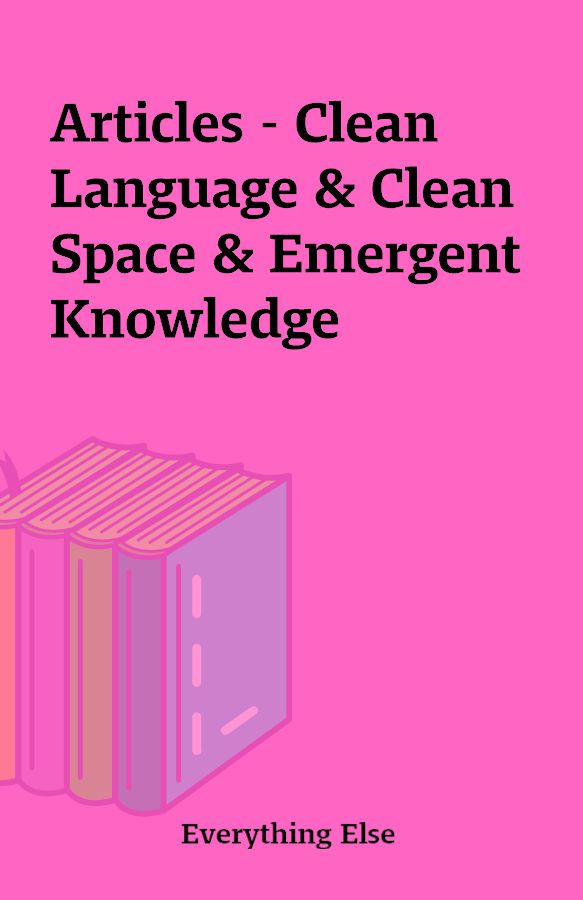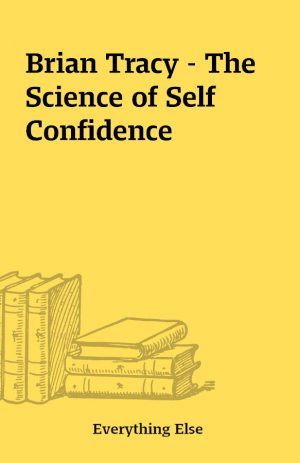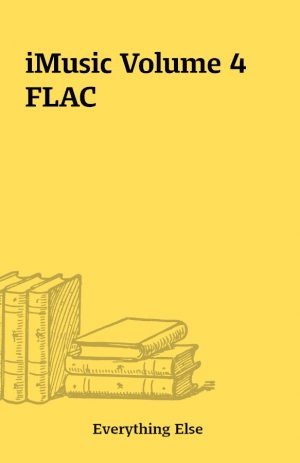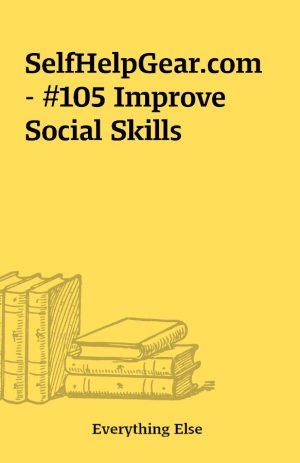Articles – Clean Language & Clean Space & Emergent Knowledge
Articles – Clean Language & Clean Space & Emergent Knowledge
[ Webrip – 19 PDF ]
Description
**** elib.tech Exclusive ****Help us keep elib.tech all the more special for its exclusivity.Out of respect for the original authors and publishers,please do not make this product available outside of our community.Thanks for keeping elib.tech awesome! GB Status : CLOSED GB Page : Clean Language & Clean Space & Emergent Knowledge GB A Moment in metaphor‘Moment’ is a metaphor for TIME (‘in the moment’), SIGNIFICANCE (‘moment of choice’), and MOVEMENT (‘momentum’). Every moment of our lives is of infinite significance in that it has the potential for movement and change.The purpose of the article is to expand the moment it takes for a person to process and communicate information, and the moment it takes another person to respond. To make these fragments of time long enough to consider what happens consciously and unconsciously in the minds of both parties. And to consider how that may inform a therapeutic or personal development facilitator at the moment of their next intervention.The author suggests that the verbal and nonverbal information we have about others at any given moment is symbolic in nature. He asks the reader to consider what happens when their response to that is in Clean Language, and what happens when it is not.Autogenic metaphor Therapy by Rob McGavockDavid Grove was always seeking ways of removing the therapist even further from the therapeutic equation. He had many ingenious ideas for encouraging people to do self-healing. Inspired by his methods, therapist Rob McGavock outlines an eight-stage autogenic (self-questioning, self-determined) process that can be utilized by individuals without a facilitator.The individual in the case example recorded here had target symptoms of general anxiety and anxiety about public speaking, which fluctuated in intensity despite the individual having conducting hundreds of public presentations.Rob is a Licensed Professional Counselor, therapist, and educator based in Columbia, Missouri. He is a longtime student of David Grove’s work in Clean Language and Therapeutic metaphor.Breathing In Blue by Clapton Duck Pond: Caitlin WalkerIn this article for the journal Counselling Children and Young People, Caitlin describes how she went about meeting this challenge using Clean Questions, Therapeutic metaphor, and NLP (Neuro Linguistic Programming). “I wanted the students not only to have more self-awareness and self-control,” she says, “but also to learn the skills I was using so that they would be less dependent on other people to keep on developing in the future.”Clean Process by Jennifer de GandtAn innovative approach to accelerated learning for Business that combines Clean Language, Clean Space, and Emergent Knowledge with Arny Mindell’s Process Work.Clean Process shows how rational thinking processes can be enriched by access to a deeper field of information often neglected in business thinking. The article covers the advantages to individuals and groups and the benefits that Clean Process training can bring to Management Trainings in general.Jennifer de Gandt is a consultant, trainer, and coach with 25 years experience in management education and training. She introduced David Grove’s work in ‘Clean’ into France in 2000 and has been developing Clean-related applications for business ever since.Eureka! The Emergence of the Simple SolutionRumour has it that Archimedes’ discovery of a formula for calculating volume and density came to him while he was on a visit to the local baths. His sudden realization about a body’s displacement of water may have come about when he slipped on a bar of soap, but we can be sure that the actual mathematics involved were the result of a great deal of earlier brainwork.In a Clean facilitative process, information accumulates, iterates, and in the right circumstances reorganizes suddenly, when simple solutions emerge. What is iteration? How can iterative questions be helpful in therapy, coaching, teaching, and training, where it might only take one or two small changes to produce life-changing effects?This article is a primer to the Clean process of Emergent Knowledge and the Power of Six, in which people are facilitated to solve their own problems and transform their own symptoms in a simple but profoundly effective way. The word ‘eureka’ (“I have found it!”) comes from the same root as ‘heuristic’, a strategy for working your way towards the solution to a problem. Take the prescribed steps over and over again in an iterative process and you can expect emergence to occur!Healing and Perception by Dr. Sheila Stokes“As a doctor who worked in general practice,” says Sheila Stokes, “I was particularly aware of the difficulties of communication where doctor and patient each had their own way of perceiving. To perceive is not just about sight; it is about all the senses. It is also about becoming aware or conscious; of realizing or understanding. These are the kinds of perceiving we do all the time and usually we don’t think twice about them, but they have profound implications for the healing process.” The author discusses the use of Clean Language in a clinical setting as an invaluable aid to providing for the special needs of each individual patient. “It reduces the problems of patient/doctor transference,” she writes, “helps reduce misunderstandings, and minimizes the doctor’s interference with the power of the patient’s own self-healing.”INSIDE INFORMATION and THE POWER OF SIXAuthor interview with Philip Harland reproduced by kind permission of Rapport, the quarterly magazine of the Association for NLP (www.anlp.org).Throughout our lives, we encounter symptoms that we find hard to understand or resolve. We create these in ways that are uniquely structured to our personalities, which means that healing has to arise from the same uniqueness. How can the Power of Six help us tap into the inner worlds of our own wisdom? This 1,700 word article is an introduction to Emergent Self Knowledge, a radically different approach to the medical model and to conventional therapies, yet entirely compatible with either.Pointing to a New Modelling PerspectiveJames Lawley, co-author of ‘metaphors in Mind’, introduces his latest work in Symbolic Modelling:“After more than a decade of searching for a satisfying analogy that describes the perspective I take when symbolic modelling, I’ve finally found one right under my nose. It is the simple and everyday act of pointing. It wasn’t until I came across Raymond Tallis’ Michelangelo’s Finger – a whole book devoted to pointing – that I realised just how much mental activity is involved. The moment I understood what the recipient of pointing has to do with their attention, I thought: ‘That’s what we do. That’s how we model symbolically’. Before exploring what pointing can reveal for symbolic modellers, I will examine how pointing works and what both facilitator and client have to do with their attention during pointing.”Six Steps To Emergent Knowledge: David Grove’s original process Presents the original principles and processes of Emergent Knowledge and the Power of Six which their creator, the innovative therapist David Grove, was using and teaching in the months before he died. It will be of value to all Clean facilitators – therapists, counsellors, coaches – and anyone interested in new ways of working with others.The first key concept of Emergent Knowledge is that of the networking of information formed from knowledge held in a number of spaces. The next is the principle of iteration. In the context of a therapeutic intervention, iteration is the repetition of a question the answer to which incorporates the knowledge gained as a result of the preceding question. It is a simple systemic process. When enough nodes of information integrate – and the number, Grove discovered, was almost always six – a threshold is crossed and new knowledge emerges naturally from the system.The therapist or coach is neither the instigator nor the interpreter, but the facilitator – the catalyst – of systemic emergence. Scientists, technologists, economists, and psychologists are finding a huge variety of uses for systemic emergence. This paper introduces a basic application in the area of therapy, self-discovery, and coaching. It is in three parts: Principles of Emergent Knowledge, Basic Processes of Emergent Knowledge, and Running an Emergent Knowledge Session.Matthew and Philip collaborated with David Grove on the development of Emergent Knowledge. Matthew is a therapist and NLP trainer who was David’s assistant. Philip is a psychotherapist who ran EK/6 seminars and co-facilitated clients with David.The Six-Fibonacci Series David Grove’s Power of Six combines with the Fibonacci sequence in an advanced process for therapy and coaching.You can find a statue to Fibonacci in the Santo Campo cemetery near the Leaning Tower of Pisa.Now does maths mimic nature, or is it the other way round? The significance of Fibonacci and his series is that it describes a prevailing pattern in nature. The numbers govern almost all branch, leaf, and petal formation in trees, plants, and flowers. How plants conform to the Fibonacci sequence is directly linked to the efficiency of the growth process and the maximising of space and light for each petal, leaf, and branch. The plants have evolved by adapting to their surroundings – they know how to grow in the most efficient way possible. There is a lesson here for humans. We evolved into a Fibonacci world and the underlying supposition of the Six-Fibonacci process is that the numbers form the basis of a natural pattern of growth and change innate to forms of life other than plants.The article outlines a demanding 6-stage process that adapts to almost any therapeutic or developmental need. Facilitators should have existing experience of Clean Language and the Power of Six or be able to get supervised practice.Tracking Emergence: Maurice Brasher digs deep How can a knowledge of the universal phenomenon of emergence help us better understand the facilitative processes of Emergent Knowledge and Clean Language?Linguistics and systems researcher Maurice Brasher digs deep and shares his discoveries.Every item of self-knowledge a client acquires is the result of a process of ’emergence’. In this examination of the fundamental nature of the phenomenon (the first in a series), linguistics and systems researcher Maurice Brasher looks at its relationship to Emergent Knowledge and Clean Language. What happens when the client is encouraged to pay attention to the emerging substance of their experience (the content) rather than to ‘getting the story right’ (the form)? Brasher worked with David Grove on the history, meanings, and evocations of the words clients use, and particularly on what the ‘slippages’ between words – gaps, coincidences, puns, and double-entendres – could reveal. “We are not the proprietors of emergence,” Brasher points out, “but we can be its beneficiaries.” The author is a leading member of the French ‘Clean’ community. Consultant, coach, and teacher pioneering Learning by Discovery and Close Observation.; translator of books by Ken Wilber, Robert Dilts, and Arnold Mindell; conflict facilitator, NLP trainer, and Emergence researcher.http://www.wayfinderpress.com/articles.html
You must be logged in to post a review.






Reviews
There are no reviews yet.